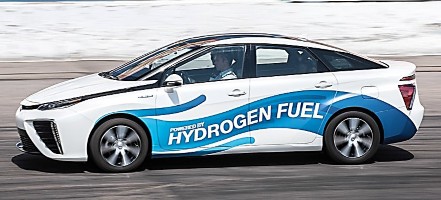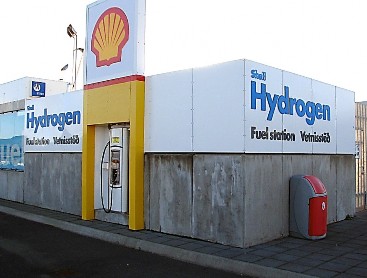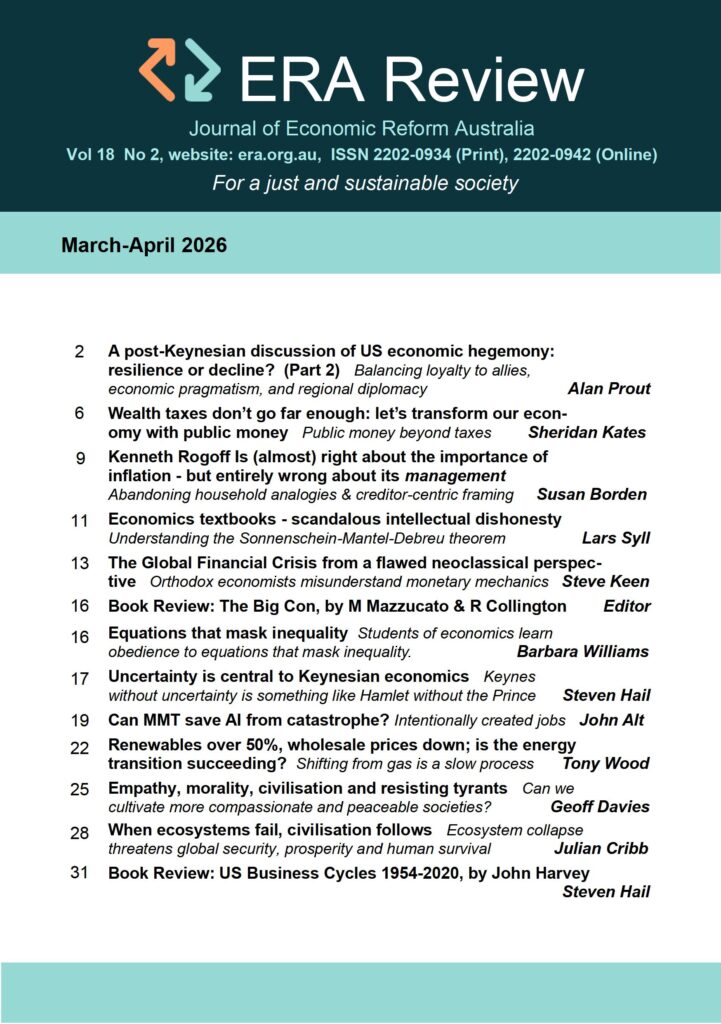Contradictions of the hydrogen economy
Greg Reid

There is much hype as well disinformation about the potential of hydrogen but there is no doubt that a lot hangs on this new energy carrier. A race has begun to break the power of fossil fuel states like Russia and Saudi Arabia. The war in Ukraine has galvanised action far more than heat waves, record droughts and floods. Hydrogen will be critical in this transition and Australia could become collateral damage.
The key market niche of fossil fuels is their ability to act as a form of energy that can be transported and then stored for long periods of time. Hydroelectric power can be stored in a dam but it cannot be relocated. Batteries can be transported but can only store limited amounts of power for limited periods of time. For comparison, Victoria is planning to have around 12GWh of grid scale, battery storage by 2035, essential for grid stability but less than the equivalent of 0.5% of the energy carried in one international oil tanker.
When it comes to meeting the energy demands of European winters or of the global transport networks, oil and natural gas have been critical and some commentators have argued that hydrogen cannot compete as a substitute. Unfortunately, the peculiar properties of hydrogen make for strange numbers that can make comparisons to oil and gas very confusing.
Hydrogen atoms are the smallest and lightest atoms of all the elements. A litre of liquid hydrogen is eleven times lighter than gasoline and six times lighter than liquified natural gas (LNG). Measures of energy stored per kilogram of hydrogen will give larger figures than fossil fuels but in any sort of container or tanker, fossil fuels actually hold more energy per litre.
Liquid hydrogen also poses some difficulties in that it has to be maintained at temperature –253 deg.C., while its molecules are so small that they can leak through the walls of some solid metal pipes. In addition, when hydrogen is burnt in air, some nitrogen reacts with it to form nitrous oxide, which has a greenhouse warming potential some 273 times higher than that of carbon dioxide.
On the other hand, hydrogen also has some big advantages. Hydrogen can be used in fuel cells to produce electrical power at nearly twice the efficiencies of fossil fuel turbines and produce only water as waste. Hydrogen can be produced almost anywhere by electrolysis of water or even from humidity in the air and that means it can be made by countries that lack fossil fuels. And finally, the most potent advantage of hydrogen is that it can be produced using waste energy when renewable wind or solar power exceeds demand and this is the much vaunted “green hydrogen”. Other so-called colours of hydrogen are made from fossil fuel energy.
Pragmatically there is one more reason why hydrogen is getting a lot of financial backing. Some sectors of the fossil fuel industry have realised that a lot of their expensive infrastructure might be repurposed and rescued for the transport and storage of hydrogen. Bizarrely, a litre of Ammonia actually contains more hydrogen than a litre of liquid hydrogen (since ammonia molecules each contain three hydrogen atoms). In the form of ammonia, hydrogen is much easier to liquify and to move in refurbished pipelines. Ammonia has been traded in bulk for decades and may become the dominant form of hydrogen transport.
There are many technical challenges to overcome but the basic economic driver is that excess renewable energy can be converted into a storable liquid form for which there is rapidly increasing demand. While the wholesale price of this energy may be more per litre than fossil fuels the shift toward hydrogen is being driven by necessity and good residual margins. Meanwhile, demand and margins for fossil fuels will contract, driven by politics and climate reality.

Initially, the main demand for hydrogen will be as a bulk energy store. In some applications like home heating and private cars, hydrogen is a cumbersome substitute but fossil fuels will still be displaced in these applications by heat pumps and battery electric vehicles. Japan and South Korea have for some time been looking to develop “green hydrogen”. Europe has now joined this powerful block of demand. With limited land area for solar power, all these countries are seeking partners like Australia to produce and export “green hydrogen”.
Very large Hydrogen investment deals in Australia are already in the various stages of planning, financing or construction. There are great opportunities and risks. Politicians are often too eager to approve billion-dollar projects without considering the national consequences. All energy projects should include domestic energy reservation clauses.
Despite massive natural gas extraction in Australia, there is a shortage of domestic supplies. In addition, up to 10% of electrical production is consumed to liquify LNG for export and consequently pushes up power prices. Both these risk types exist with hydrogen and are coupled with the pressures created by fundamental change in an economy currently dependent on fossil fuels.
International production chains for vehicles, heavy engineering and consumer goods are already in a process of change and Australia is ill prepared for this transition.
Australia will need to actively adjust to the new market paradigm or risk being marginalised in a new global economic system. This will mean seeking to become a source not only of “green hydrogen” but also of battery materials, rare earths, electrolysers etc. It will also mean actively transforming internal transport systems and aiding the transition of industries such as farming. Green hydrogen is just one opportunity that will arise from the periodic excesses of wind and solar energy. Given assured access to some of this cheap energy would give Australian industry a competitive advantage that could grow jobs beyond the mining and energy sector.
Australia can still be a “lucky country” in the hydrogen economy but only if it learns from the pitfalls of the fading LNG boom and if it anticipates the many challenges of this new energy supply.
Greg Reid is an ERA member resident in NSW.































